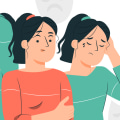Psychotic disorders (such as schizophrenia) eating disorders. Anxiety disorders are a group of mental health disorders that include generalized anxiety disorders, social phobias, specific phobias (for example, agoraphobia and claustrophobia), panic disorders, obsessive-compulsive disorder (OCD) and post-traumatic stress disorder. If left untreated, anxiety disorders can cause significant deterioration in people's daily lives. Bipolar affective disorder is a type of mood disorder, formerly called “manic depression”.
A person with bipolar disorder experiences episodes of mania (euphoria) and depression. The person may or may not experience psychotic symptoms. The exact cause is unknown, but a genetic predisposition has been clearly established. Environmental stressors can also trigger episodes of this mental illness.
Depression is a mood disorder characterized by decreased mood, loss of interest and enjoyment, and reduced energy. It's not just feeling sad. There are different types and symptoms of depression. There are different levels of severity and symptoms related to depression.
Symptoms of depression may increase the risk of suicidal thoughts or behavior. Anxiety disorders are common mental health problems that affect many people. Explain what anger is and how to deal with it in a constructive and healthy way. Explain anxiety and panic attacks, including possible causes and how you can access treatment and support.
Includes tips for helping yourself and guidance for friends and family. Explain what bipolar disorder is, what types of treatment are available, and how it can be helped to cope with it. It also provides guidance on what friends and family can do to help. Explain what body dysmorphic disorder (BDD) is, its possible causes and how you can access treatment and support.
Includes tips for helping yourself and tips for friends and family. A mental disorder is characterized by a clinically significant alteration in an individual's cognition, emotional regulation, or behavior. It is usually associated with distress or deterioration in important areas of functioning. There are many different types of mental disorders.
Mental disorders may also be referred to as mental health conditions. The latter is a broader term that encompasses mental disorders, psychosocial disabilities, and (other) mental states associated with significant distress, impaired functioning, or the risk of self-harm. This fact sheet focuses on mental disorders described in the eleventh revision of the International Classification of Diseases (ICD-1). Schizophrenia affects approximately 24 million people, or 1 in 300 people.
People with schizophrenia have a life expectancy 10 to 20 years lower than the general population (. Schizophrenia is characterized by significant perceptual deficiencies and behavioral changes. Symptoms may include persistent delusions, hallucinations, disorganized thinking, very disorganized behavior, or extreme agitation. People with schizophrenia may experience persistent difficulties with their cognitive functioning.
However, there are a variety of effective treatment options, including medications, psychoeducation, family interventions and psychosocial rehabilitation. Neurodevelopmental disorders are behavioral and cognitive disorders, is that it? they arise during the developmental period and involve significant difficulties in the acquisition and execution of specific intellectual, motor, linguistic or social functions. Health systems have not yet adequately responded to the needs of people with mental disorders and have a significant shortage of resources. The gap between the need for treatment and its delivery is wide worldwide and is often of poor quality when administered.
For example, only 29% of people with psychosis (and only a third of people with depression) receive formal mental health care (. People with mental disorders also need social support, including support to develop and maintain personal, family and social relationships. People with mental disorders may also need support for educational programs, employment, housing, and participation in other significant activities. The WHO Programme of Action against the Mental Health Gap (mhGAP) uses evidence-based technical guidelines, tools and training packages to expand services in countries, especially in resource-poor settings.
Although mistakenly thought to be a single disorder, dementia is a term that encompasses a wide range of specific mental conditions. Mental illness can be caused by a reaction to environmental stress, genetic factors, biochemical imbalances, or a combination of these. Learn how recreational drugs and alcohol can affect your mental health, even if you take psychiatric medications. With the right care and treatment, many people learn to cope with or recover from mental illness or emotional disorder.
If you've been diagnosed with a mental health problem, you may be looking for information about the diagnosis, treatment options, and where to go for help. You may also have a behavioral health disorder and still have long periods of good mental health. However, your healthcare provider may perform tests, such as blood tests or imaging tests, to rule out other conditions that may affect mental health. Mental health problems may be related to excessive stress due to a particular situation or a series of events.
Mental illness is a general term for a group of illnesses that can include symptoms that can affect a person's thinking, perceptions, mood, or behavior. While there are effective prevention and treatment options, most people with mental disorders do not have access to effective care. It's important to keep in mind that having poor mental health doesn't always mean you have a behavioral health disorder. At any given time, a diverse set of individual, family, community and structural factors can combine to protect or undermine mental health.
. .






